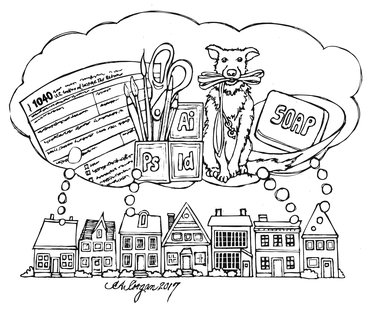Make it simple to certify a home business
Dog-walking. Soap-making. Tax prep. Graphic design. What could these possibly have in common?
They are all local home businesses. They are sprouting up everywhere, and there is a simple way to encourage them while also regulating them. Zoning is important but should not be prohibitive.
We’re living in the Age of the Internet when entrepreneurs with good ideas and gumption can get the word out electronically on what they have to offer, and provide that service without ever leaving their homes. Or they can organize the business from home — say, dog-walking and pet-sitting or house-cleaning and care-giving — and then travel to the place their services are needed.
Home businesses are great for parents who want to be with their children while still earning a living. At the other end of the age spectrum, they can be good for retirees who want to supplement their income without entering the daily fray of the workaday world.
Seven years ago, the town of Guilderland came up with a category for its zoning code — Minor Home Occupation — that would make it simple for residents to be allowed to work from home. Prior to the new classification, home businesses in a residential zone had to apply for and be granted a special-use permit.
This can be an arduous process. For example, we’ve been covering for a year-and-a-half now the process Cynthia Elliott has gone through after applying for a special-use permit in the town of New Scotland. She wants to run a business hosting events like weddings 15 times a year on the property where she lives, which is zoned residential-agricultural. She has spent thousands of dollars meeting requirements for various studies.
We understand and endorse the need for zoning. Good zoning protects not just property values but quality of life. People living in a residential neighborhood, for instance, don’t want to put up with the noise and traffic of a business in their midst. Proper zoning also protects public health. If a business, for example, doesn’t have a required septic system, it could pollute a neighbor’s well.
Local governments must balance the public’s well being against the need for a robust economy. At the same time, laws must be enforced consistently.
We admire the initiative in Knox to list businesses on the town’s website. On the face of it, the listing looked like a good way for the town to promote local businesses — to let neighbors be aware of nearby services while encouraging a healthier economy.
But the town attorney, John Dorfman, raised a valid point at this month’s town board meeting: With such a listing, the town would be required to enforce zoning laws that might prohibit some of the businesses. (See related story.)
Knox Supervisor Vasilios Lefkaditis went on to suggest that already-existing businesses be given amnesty from the law while, going forward, the zoning code could be fairly enforced on new businesses. Lefkaditis also said, if he were trying to set up a new business in Knox and was told he couldn’t, he’d sue for unfair enforcement of the law. That could certainly happen. The town opens itself up to legal action by not enforcing its laws consistently.
As it is now, Knox businesses that existed before the zoning law was adopted in 1974 are allowed but they cannot expand.
What often happens when zoning laws are not consistently enforced is that neighbors who are suffering from the transgression have to force the matter. This places an unfair burden on residents and it also means that enforcement continues to be spotty — the law is enforced only when someone complains.
Knox currently has just one business district, with no businesses in it. As the town gears up for a public hearing on three more business districts, it would be wise to take a wide view on all of Knox’s existing businesses.
The solution that Guilderland came up with in 2010 is a good one. Small home businesses that have no effect on neighbors or the surrounding environment don’t require extensive and expensive review. Guilderland has a simple form that property owners can fill out in just a few minutes; it puts them on record as a certified minor home occupation.
The eight listed requirements make sure the business wouldn’t change the character of the neighborhood or have a negative effect on the environment. If the listed requirements are not met, the applicant must apply for a special-use permit and go through that process.
Setting up such a system in Knox makes more sense than granting blanket amnesty to any business set up illegally after the 1974 zoning law was adopted. We have no quarrel with still allowing the businesses that existed before the code was adopted; they broke no law.
We would guess that many of the home-business owners in Knox would breathe a sigh of relief to fill out a simple form to legitimize their business and not have to worry about enforcement.
If they don’t fit the criteria, then they should have to go through the special-use permit process. This is the means by which the town protects all of its residents. If the permit isn’t granted, there’s at least one business district in town where the business could go.
With the businesses in Knox properly certified, the town board could promote them without any qualms. That would be good for the businesses, good for the local residents, and good for the town. And it could serve as a beacon for other towns to follow.
— Melissa Hale-Spencer



